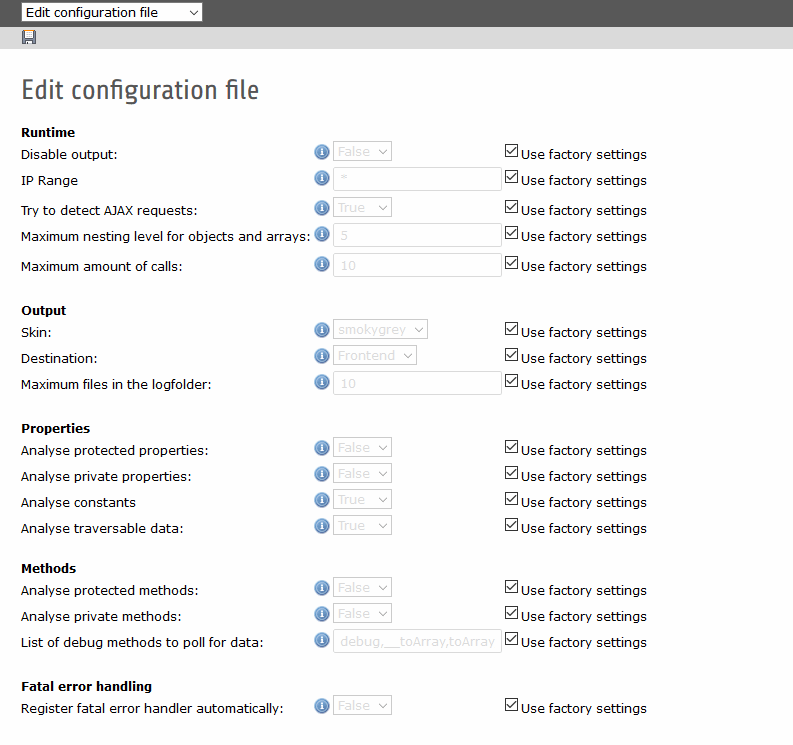Configuration options¶
We have provided an editor for the configuration file settings:
Output¶
| Option | Description | Possible values / example |
|---|---|---|
| Disable output | Is kreXX actually active? Here you can disable kreXX on a global level without uninstalling it. |
|
| IP Range | IP white list (comma separated) with wildcard (*) support. List of IPs who can trigger kreXX. You can do something like ‘192.168.1.*’, but not something like ‘192.168.*.110’. |
192.168.0.110,192.168.1.* |
| Skin | You can change the CSS/HTML skin. We included the Hans and Smoky-Grey skin |
|
| Destination | Will the output be sent to the frontend or the logfolder? |
|
| Maximum files in the logfolder | How many files should it keep? Files will only get deleted, when a new one is created. | 10 |
Runtime¶
| Option | Description | Possible values / example |
|---|---|---|
| Try to detect AJAX requests | Shall kreXX try to detect an AJAX request? If set to true, there will be no output when AJAX is detected, to prevent a js error. |
|
| Maximum nesting level | How deep shall we analyse objects? When kreXX reaches a certain level, it simply stops there and won’t go any further. |
5 |
| Maximum amount of calls | How often can you call kreXX in one run? kreXX can generate a lot of data, and depending on your settings increasing this number might not be a good idea. |
10 |
| Minimum amount of memory [MB] | kreXX checks regularly how much memory is left. Here you can adjust the amount where it will trigger an emergency break. Unit of measurement is MB. | 64 |
| Maximum Runtime [Seconds] | kreXX checks during the analysis how much time has elapsed since start. Here you can adjust how many seconds can pass until an emergency break will be triggered. Unit of measurement is seconds. | 60 |
| Use scope analysis | kreXX will analyse all values and methods that can be reached from the point where the analysis was called. This will automatically overwrite existing configurations, it can be considered the “auto config mode”. |
|
Properties¶
| Option | Description | Possible values / example |
|---|---|---|
| Analyse protected properties | Shall kreXX create a reflection and poll it for data? kreXX will analyse all protected properties of a class. |
|
| Analyse private properties | The same as Analyse protected properties, only for private properties. |
|
| Analyse constants | kreXX will analyse all constants of a class. |
|
| Analyse traversable data | Shall kreXX try to traverse through the object? |
|
Methods¶
| Option | Description | Possible values / example |
|---|---|---|
| Analyse protected methods | Shall kreXX analyse all protected methods of an object? |
|
| Analyse private methods | Shall kreXX analyse all private methods of an object? |
|
| Analyse getter methods | Shall kreXX try to determine the output of getter methods? Getter methods will NOT get called to get a result. Instead, kreXX tries to get the (possible) result from the properties of this class. If the getter method is used to compute this value, the values here may be inaccurate. |
|
| List of debug methods to poll for data | Which additional methods shall be called from the object? Comma separated list of methods. These methods are called without parameters. They also might do stuff which might be unwanted. |
debug,toArray,__toString, toString |
Error Handling and Backtrace¶
| Option | Description | Possible values / example |
|---|---|---|
| Register fatal error handler automatically | When set to “true”, kreXX will register the handler as soon as it’s loaded. When a fatal error occurs, kreXX will offer a backtrace and an analysis of all objects in it. PHP always clears the stack in case of a fatal error, so kreXX has to keep track of it. Be warned: This option will dramatically slow down your requests. Use this only when you have to. It is much better to register the error handler yourself with
krexx::registerFatal();and later unregister it with
krexx::unregisterFatal();to prevent a slowdown.
|
|
| Maximum steps in the backtrace | A backtrace tends to produce a lot of output, and browsers tend to have problems with more than 100MB output in HTML text. Normally it is not unneccessary to go back more than 10 steps, but if you need to, you can increase this number here. | 10 |

